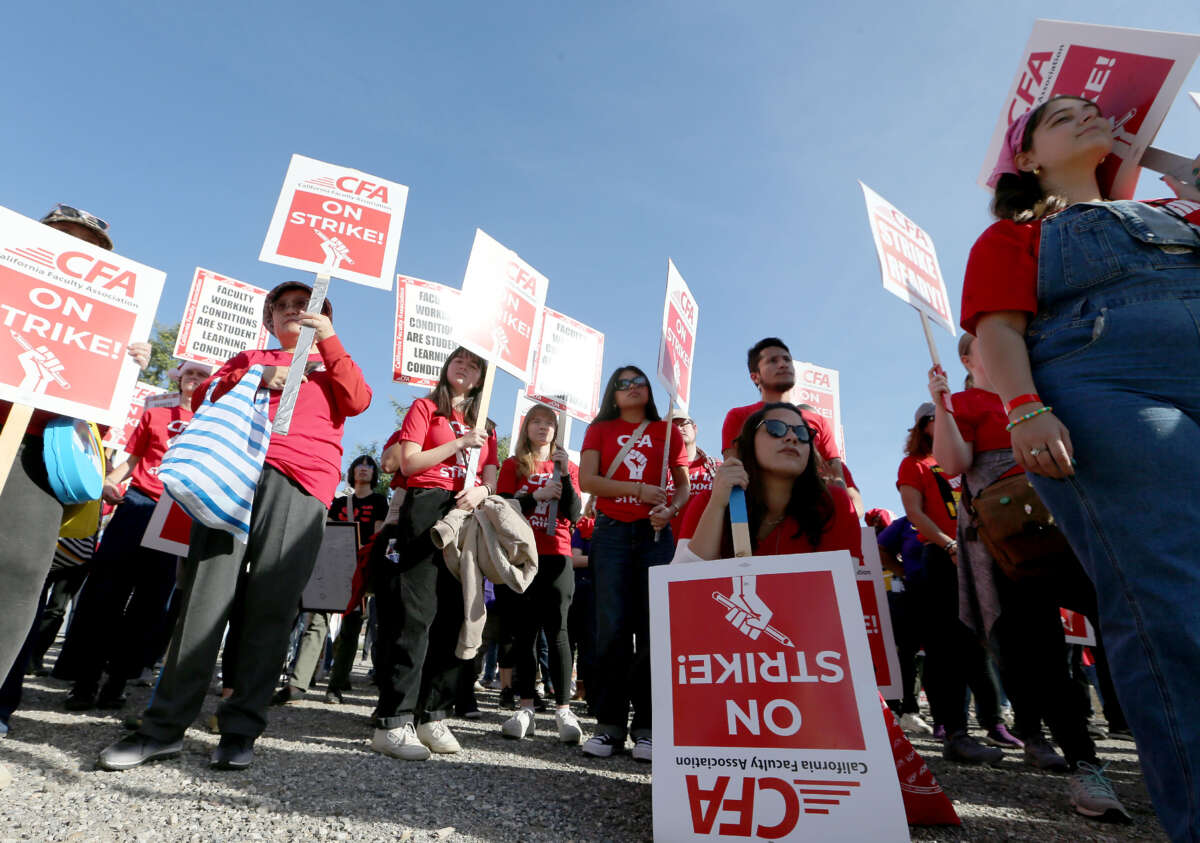Truthout is a vital news source and a living history of political struggle. If you think our work is valuable, support us with a donation of any size.
On Monday, faculty at California State University (CSU), the largest public university system in the U.S., went on strike to demand higher pay and expanded parental leave.
The faculty, represented by the California Faculty Association (CFA), are demanding a 12 percent salary raise and an increase in parental leave from six weeks to a full semester for professors, librarians and other workers.
“What we’re doing is in the spirit of maintaining the integrity of what the public education system should be for,” Maria Gisela Sanchez, a counselor at Cal Poly Pomona, told AP News. “Public education belongs to all of us.”
CFA represents 29,000 workers across the university system’s 23 campuses and is planning a series of one-day strikes this week at San Francisco State University (SFSU), California State University-Los Angeles, and California State University-Sacramento.
“They can afford to provide fair compensation and safe working conditions,” Anne Luna, president of the faculty union’s Sacramento chapter, said in a statement. “It’s time to stop funneling tuition and taxpayer money into a top-heavy administration.”
There is a huge disparity between administrator and faculty salaries. Mildred García, the chancellor of the CSU system, made just under $1 million in total compensation in her first year — more than triple Gov. Gavin Newsom’s compensation. Additionally, according to CalMatters, between 2007 and 2022, the base salaries of CSU presidents have grown an average of 43 percent and the chancellor’s base salary increased by 38 percent. In contrast, the salaries for lecturers rose only by 22 percent to an average of $71,255 a year, in a state where a single person needs to make at least $80,000 a year to live comfortably.
Faculty are also concerned about looming staff cuts. Earlier this fall, the SFSU administration informed lecturers that they should expect massive layoffs in the spring. An estimated 125 full time positions may be cut, according to an August presentation by the school’s budget committee.
Third year SFSU student Armin Abolhassani told NBC Bay Area that he is in support of the strike, despite many, if not all, of his classes being shut down. “I support it because it is really disheartening what’s happening this semester with all the professors being laid off, a lot of great professors have been losing their jobs who have been working here for decades,” he said.
“If they don’t give us a better offer, then we know we start organizing for larger systemwide strikes in the spring,” Brad Erikson, a lecturer at SFSU and a chapter president for the CFA, told NBC Bay Area.
Other CSU workers have also demanded better pay and bargaining rights over the past few months. In October, student workers became eligible to vote to form a union, and in November, plumbers, electricians and maintenance workers employed by the university system held a one-day strike. Teamsters Local 2010, which represents the workers, plans to strike in support of the faculty union.
“Teamsters will continue to stand together and to stand with our fellow unions, until CSU treats our members, faculty and all workers at CSU with the fairness we deserve,” Jason Rabinowitz, secretary-treasurer for Teamsters Local 2010, said in a statement.
Last year, 48,000 teaching assistants and graduate student workers at the university system went on strike, constituting the largest academic strike in US history. The strike resulted in an increase in compensation, child care reimbursement, paid leave, and fee remissions for academic student employees.
Hundreds of students are expected to join the picket lines to support the striking faculty.
Press freedom is under attack
As Trump cracks down on political speech, independent media is increasingly necessary.
Truthout produces reporting you won’t see in the mainstream: journalism from the frontlines of global conflict, interviews with grassroots movement leaders, high-quality legal analysis and more.
Our work is possible thanks to reader support. Help Truthout catalyze change and social justice — make a tax-deductible monthly or one-time donation today.
